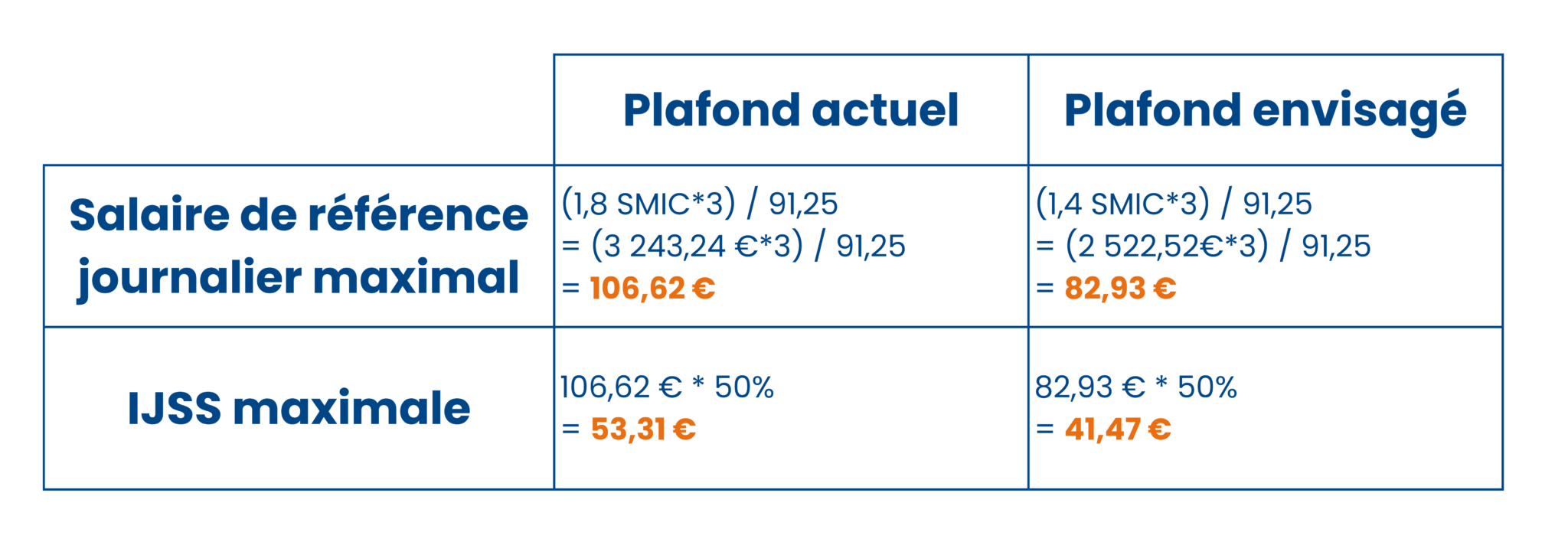Partager
The measure announced by the previous government has just been confirmed, with the publication of a decree(Decree no. 2025-160 of February 20, 2025).As announced by the previous government, the ceiling on the daily reference salary used to calculate the Indemnités Journalières de la Sécurité Sociale (IJSS) will be lowered.
Although the initial draft decree received a negative opinion, the 600 million euro savings envisaged have not been abandoned by the public authorities. The Centre Technique des Institutions de Prévoyance (CTIP) was largely opposed to the measure, arguing that it would have a considerable deferral impact on provident schemes, as well as a financial impact on policyholders.
What is the reference daily wage?
The "salaire journalier de référence" (SJR) is the amount used to calculate certain social benefits, in particular Social Security daily allowances for work stoppage. It corresponds to the average gross salary received over the three months preceding the work stoppage, divided by 91.25 days. This calculation is used to determine the daily compensation, up to a ceiling set by law.
How is the daily reference wage calculated?
The daily reference wage is a key element in determining unemployment benefit in France. It is calculated on the basis of gross earnings received by the jobseeker during a reference period.
Formula for calculating the daily reference salary :
SJR = Reference salary / number of days worked
Reference salary: this is the sum of gross remuneration (including bonuses, with some exceptions) received over the last 24 or 36 months, depending on the age of the applicant:
- 24 months for under 53s
- 36 months for those aged 53 and over
Number of days worked: this is the total number of calendar days (including weekends and public holidays) over which salary has been received, in the reference period.
How are daily benefits calculated?
The amount of the IJSS is set at 50% of the daily reference salary, calculated on the average gross salary for the last three months prior to the work stoppage.
The salary taken into account is capped at 1.8 times the gross SMIC when it exceeds this limit, i.e. €3,243.24 gross per month.
The reform changes the parameters of the ceiling, reducing it to 1.4 times the gross SMIC, or €2,522.52 gross per month. In concrete terms, the maximum daily allowance has been lowered:
Consequences for IJSS supplementary schemes
Employer-sponsored salary continuation schemes, whether legal or contractual, as well as the majority of provident schemes, express their guarantees "after deduction of Social Security daily allowances".
As a result of the "communicating vessels" effect, the reduction in compensation under the basic scheme mechanically shifts the burden onto the supplementary schemes.
The impact on the employer's salary continuation plan
As part of its legal or contractual obligations, the employer guarantees that employees who meet the conditions will continue to be paid in the event of illness.
For example, under the French "mensualisation" law, employees with between 1 and 5 years' seniority are entitled to compensation of 90% of their gross salary for the first 30 days of sick leave, after deduction of IJSS.
In practice :
- The lower the IJSS, the higher the employer's share, reaching 90% of gross salary.
- Employees who do not yet benefit from salary maintenance (due to insufficient seniority) will simply see their Social Security compensation reduced, without compensation.
Impact on pension plans
In the same way as for employer-sponsored salary maintenance, supplementary provident schemes are generally expressed as "less IJSS". In other words, the vast majority, if not all, of these plans will have to compensate for the withdrawal of the French Social Security system, in order to reach the level of cover stipulated in the contract. In other words, a drop in IJSS means a transfer of the burden to these schemes, which could influence the costs and benefits offered.
During the last renewal period, insurers pointed out that this measure could have an impact on "Incapacity" benefits, and consequently modify the balance of provident accounts.
Although the impact may indeed be significant, it will vary from one company to another, and even from one professional sector to another:
- Companies with a majority of low-wage earners: they will be little or not at all affected by this measure.
- Companies with a majority of executives or high earners: If their remuneration exceeds €2,522.52, companies will see their benefits show a significant impact.
Faced with these changes, not every company or sector will be treated in the same way when it comes to assessing the reform.
The support of a social protection broker will be essential in analyzing the real impact, based on the company's demographics, payroll characteristics, the volume of work stoppage in relation to other provident risks, and the proportion of contributions dedicated to disability in the overall contribution.
What does the reform provide for?
The reform of Social Security daily allowances, by lowering the ceiling on the daily reference salary, has led to a reduction in compensation for employees earning more than 1.4 SMIC, and has had a significant impact on salary maintenance and provident schemes.
Companies, professional branches and councils will therefore need to anticipate this development and adjust their social protection strategies. Brokers and insurers will play a key role in limiting the financial impact of this reform on the employees concerned.
FAQ, frequently asked questions :

Article écrit par
Estelle Baldereschi


 Damien Vieillard-Baron
Damien Vieillard-Baron

 Margaux Vieillard-Baron
Margaux Vieillard-Baron

 Amadou Kasse
Amadou Kasse



 Estelle Baldereschi
Estelle Baldereschi